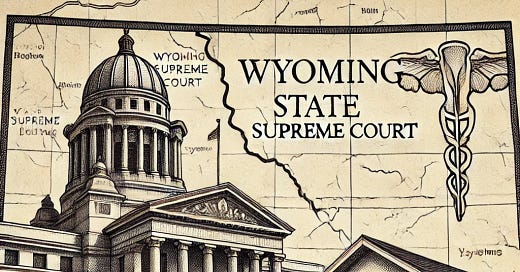Wyoming Supreme Court considers lower decision protecting abortion rights
Wyoming's Governor and Attorney General argue that a district judge's injunction preventing an abortion ban was unconstitutional and that the law should be reinstated.
Another round of litigation has happened in Wyoming’s battle over whether an abortion ban will be allowed to take effect.
The state just filed its opening brief, hoping to overturn a district judge’s injunction on the Life is a Human Right Act, which bans most abortions and the use of medications to do so. At issue is whether a constitutional amendment passed in 2012 to protect healthcare access should be extended to abortions. Megan Hayes, executive director of Pro-Choice Wyoming, questioned the validity of their arguments.
“It's just disingenuous,” Hayes said. “Sure, the state has a right to regulate it, but there has to be a compelling need. And they never had a single expert that could testify or provide any evidence that there was a compelling need to ban abortion in Wyoming.”
In November, Teton County District Judge Melissa Owens ruled that the state’s overall ban and its law banning medication abortions were unconstitutional. The overall ban would have imposed a $20,000 fine on doctors who perform abortions, along with a prison sentence of up to five years. The medication restriction would have prohibited the prescription, sale, and use of mifepristone for abortion. It would have fined the person $9,000 and carried a possible prison sentence of six months.
The recent case involved six plaintiffs. Danielle Johnson was a 22-week pregnant woman. Kathleen Dow wanted to become pregnant. Dr. Giovannini Anthony was an OB/GYN in Teton County. Dr. Rene Hinkle, of Laramie County, was another doctor who joined. Chelsea’s Fund was also a plaintiff, which provides financial support for women seeking reproductive care. As was the Circle of Hope Health Care Services, which opened an abortion clinic in Casper.
Judge Owens ruled that abortion rights were protected under the Right of Health Care Access Amendment that was passed in 2012. That protects people’s rights to make their own medical decisions.
Physician testimony about how abortion bans hamstrung their ability to care for patients was cited among the reasons that the Judge gave for her ruling. That’s been an issue in other states, where doctors have not performed abortions even in situations where exceptions called for it because they feared criminal prosecution.
In its recent brief filed with the state supreme court, Attorney General Bridget Hill and Gov. Mark Gordon argued that the court should have deferred to the legislature. It also claimed that at the time of the healthcare amendment’s passage in 2012, the lawmakers hadn’t intended it to deal with abortion.
Five justices, three of whom are women, sit on the Wyoming Supreme Court. They use a judicial nominating commission to select judges to remove politicization of the judiciary. The commission is filled with lawyers and legal experts. They provide three recommendations to the governor, who then picks one of the choices.
Hayes is optimistic about what the court would do in this case.
“I would hope in this situation, the court will just interpret and construe the plain language of our Wyoming constitution, which gives everybody, including pregnant women, the right to make their own health care decisions,” Hayes said.




